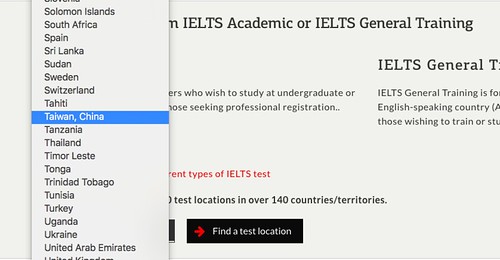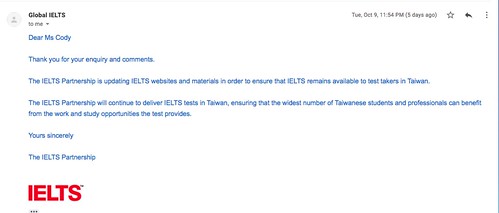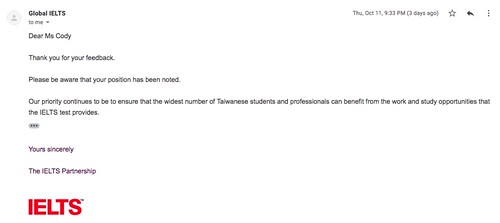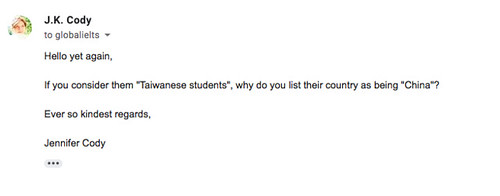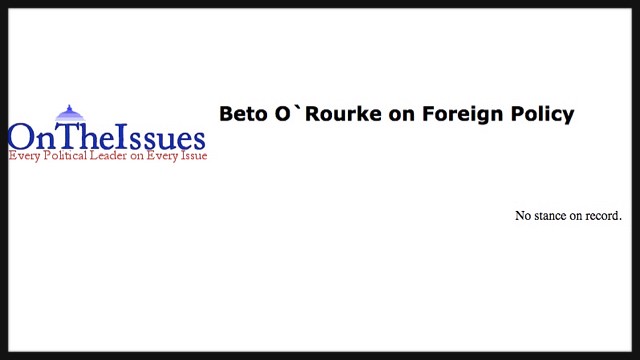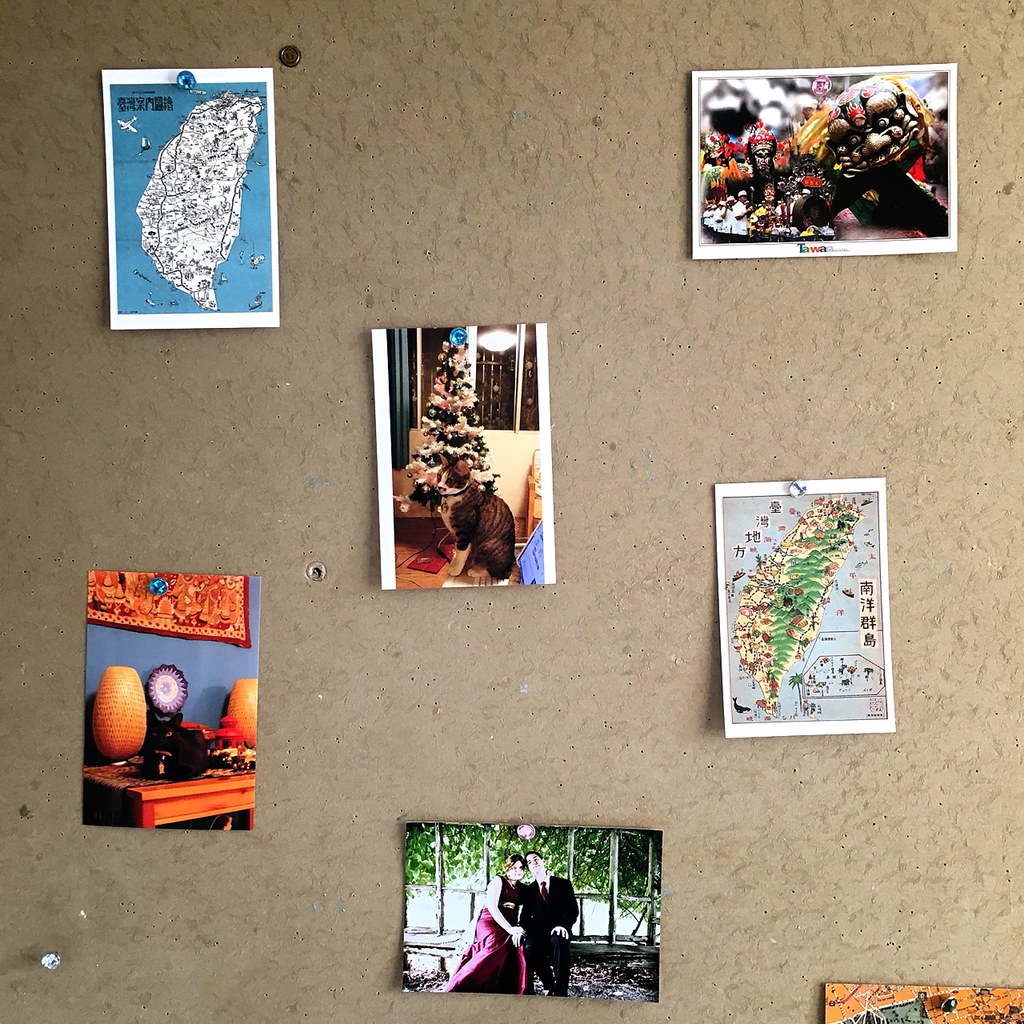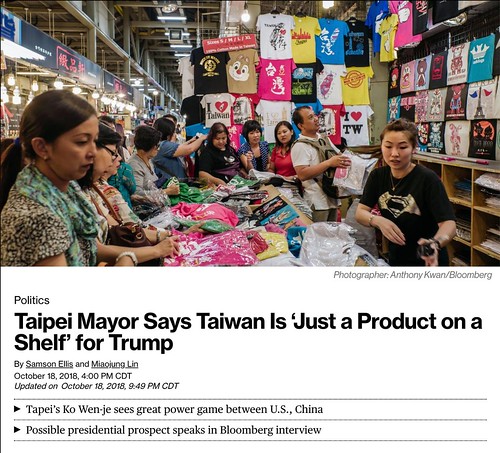 |
| The screenshot that launched a million words |
Because I'm gonna say it: he's right.
Taiwan must focus on making itself more valuable to President Donald Trump and accept its status as a pawn in the great power game between the U.S. and China, Taipei Mayor Ko Wen-je said.
Nobody likes to hear that they "must accept their status as a pawn" - but that doesn't make it untrue. We absolutely should not overestimate the US's willingness to defend Taiwan.
And he's not only right about Donald Trump, who is absolutely not a reliable ally to anyone and sees everything as an opportunity that can bolster his own self-image or worth or a threat to be eradicated (or at least shouted at incoherently), he's also right about the US in general. Not only that, it's been true for awhile.
This doesn't mean Taiwan shouldn't deal with the US, or should refuse its help, but that's not what Ko said: he said we needed a strategy to deal with this reality. That's just a correct statement.
But it seemed as though nobody wanted to hear it. What struck me was the swiftness and absolute horror of the reaction from Taiwanese activists, commentators, friends and other people involved in the struggle for a better Taiwan. The general feeling seemed to be, essentially "how could he say such a thing?"
I was a bit curious about that so I asked around, paid attention to various comment threads (like this one) on the topic, and generally just tried to get a sense of what was so terrible about essentially making an accurate, if damning, statement about the US's commitment to Taiwan.
The main point of anger doesn't seem to be the idea that Taiwan is a "pawn", but that the Ko has not equally addressed the fact that if Taiwan is a poker chip to the US, then it's also one to China. Essentially, he's speaking out about how the US sees Taiwan, but is seen by the public as worryingly - and oddly - growing closer to China.
There's a sense among many Taiwanese that Ko has questionable motives, from using China's language on two sides of the strait being "one family" to gaining Chinese state television endorsements to rumors that China is encouraging Taishang (Taiwanese businesspeople in China) to return to vote for Ko and is supporting him for a 2020 presidential run on the assumption that the KMT can't win, with Ko himself not doing much to dispel these notions. I've even heard rumors about some deeply weird cross-party alliances that...well, I won't even go there.
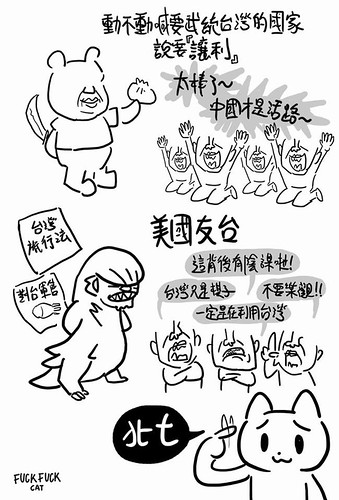 |
| From 幹幹貓: probably one of the most common things I read to improve my colloquial Chinese. It's all in Mandarin but you should check it out! |
There's also the general sentiment - captured in the Fuck Fuck Cat cartoon above - that so many Taiwanese voters and politicians are willing to bend over for China at a few sweet words promising economic incentives, ignoring China's stated and obvious intentions. These (often same) people will blast the US-Taiwan relationship as something they can't trust, despite all sorts of actually good things the US has done, from the Taiwan Travel Act to arms sales, without anything close to the ill intent of China.
So it makes sense from their perspective to worry that he'd be so dismissive of Taiwan as a commodity of the US, but silent on how China views Taiwan.
I get that too - here he basically says there is no such thing as "cross-strait relations": one could charitably parse that as "China is a foreign country like any other", but I can see how someone might hear it as "cross-strait relations don't exist because we're all the same" given some of his language choices in the past.
He goes on, however, to basically speak truth to power: saying that Trump has repeated "America First!" ad nauseam, and it's foolish to not believe him. When one reporter said "but some are insisting that you really shouldn't say 'Taiwan is just a product'", he replied, basically, "I dunno, what else am I supposed to say?"
Which...yeah.
I'm sure there are people under Trump who care about Taiwan as more than a 'product', and they've had enough say in the US's recent Taiwan policy that we've seen some real benefits. But an entire book could be written on how past administrations have seen Taiwan as a poker chip - from Bush speaking out against Taiwan independence in 2003 to Obama "selling so few arms to Taiwan that he came close to violating the Taiwan Relations Act", as a friend once put it.
The Bloomberg piece that created this poopfest goes on to say:
The outspoken former surgeon and potential presidential contender told Bloomberg News that Taiwan shouldn’t overestimate the U.S.’s willingness to defend the island from an attack by its much bigger neighbor. Ko, 59, said Taiwan needed to boost its worth to America by strengthening shared values, such as democracy and economic transparency (emphasis mine).
Again, yeah. What reasonable person would argue with that?
I could argue that playing up values like 'shared democracy' wouldn't matter - the US has a history of ignoring human rights abuses, or responding flaccidly to them, when economic benefits might be at stake (including the US's response to Tiananmen Square after 1989). That doesn't mean we shouldn't make this a selling point for Taiwan, however.
But, this is apparently not good enough: there are all sorts of rumors about his having a role in organ harvesting (getting discounts on organs from China? Something like that. I'm not too clear), on the nature of his previous visits to China and other things I won't bother with.
I'm not saying I believe all of this - I'm just pointing out that this is what is being said.
Some of the above are clearly election season character-smearing trash or at best should be taken with a Tainan Salt Museum mountain of salt, yet a lot of the comments I've been seeing slamming Ko for calling Taiwan a "product on the shelf" for the US reference the above rumors as though they are fact, and therefore prove that Ko wants to move away from a stronger relationship with the US and towards a friendlier one with China. Of course, they prove no such thing.
I don't know. I see their point vis-a-vis China - I too have been disappointed with Ko's rhetoric in this area (though much more worried about his only serious opponent's even stronger pro-China talking points). I find it odd that he'd be so quick to abandon the base that voted him in, of not-quite-DPP pro-Taiwan voters and Sunflower-energized youth to start talking like a weird old unificationist, and yet, I remain agnostic on the notion that he actually is a unificationist. I also remain agnostic on the idea that he has some deep-level "four-dimensional chess" strategy going on to deal with China: the evidence doesn't support that, either.
And I've been deeply disappointed with some in the Taiwanese electorate who are willing to believe any and all claptrap from China, who really is our enemy, and then are so quick to turn around and criticize the US.
Anyway, I get it. We big-noses are talking about how Ko is "telling it like it is" because we're just thinking about his comments vis-a-vis the US, without looking at how they stack up to his comments about China. Removed from that context, we're right. Put back in context, however, I see why this angers a certain subset of Taiwanese.
Finally, there's a sentiment among some as well that Ko supporters are becoming overly rabid themselves - acting like extremists or fundamentalists, balking at the slightest criticism (I've seen this in action, by the way - it is, in some cases, a thing). Among Ko supporters, there's a sentiment that everyone knows the guy speaks bluntly and undiplomatically, and we all say we want politicians who say what they mean, so are you really going to crucify him every time he does exactly that?
And yet, I can't repeat it enough: when you strip all that away and look at US-Taiwan relations specifically, and ignore the rumors dogging Ko in other areas, you have to admit: he's absolutely right. Trump keeps repeating "America First" - and when people tell you who they are, believe them.

